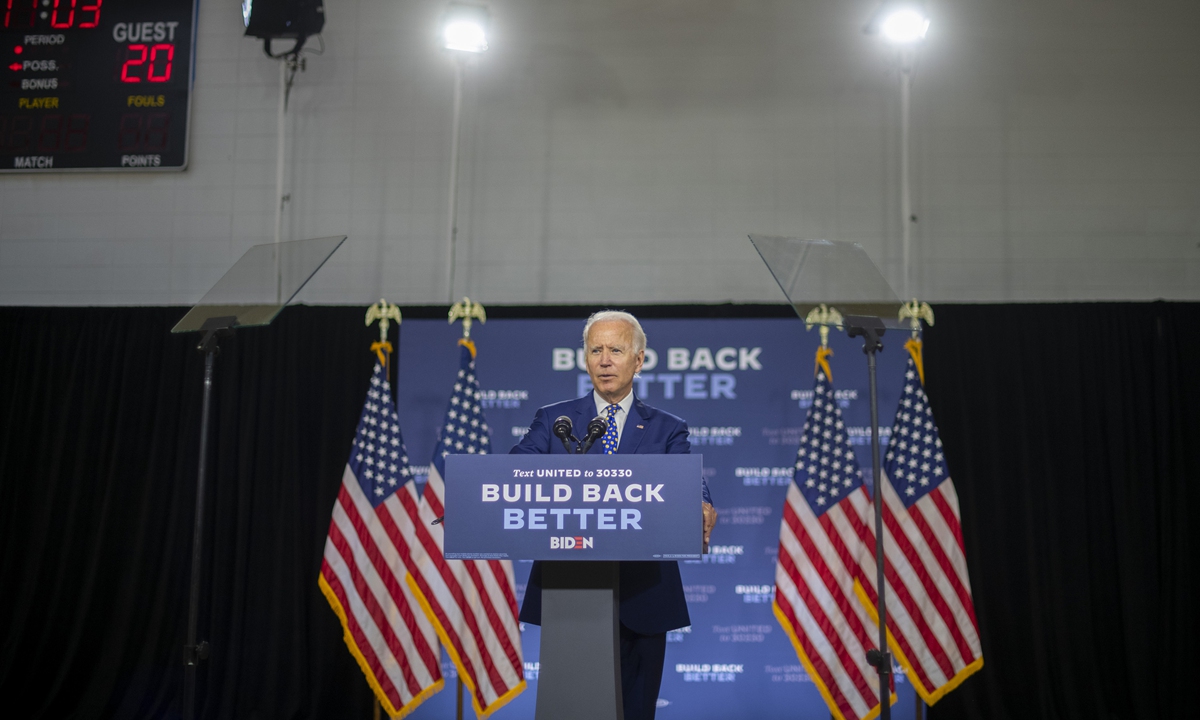Biden attacks trade deal ‘for election’
By Yang Sheng Source: Global Times Published: 2020/8/6 20:58:40
Chinese, US business circles don’t want more uncertainty: experts

Joe Biden Photo:VCG
US Democratic presidential candidate Joe Biden criticized the phase one trade deal signed by the Trump administration with China, in a move Chinese analysts said tries to attack the most important, and probably the only major diplomatic achievement of US President Donald Trump.
Experts warned on Thursday that although the Trump administration is being extremely hostile to China, maintaining the deal is still the best option for both sides. People and business circles from the two countries and the rest of the world don't want to see more uncertainty on trade anymore, so the Democrats should stay reasonable and pragmatic if they win the election, they noted.
Biden on Wednesday ratcheted up the rhetoric on Trump's handling of the country's increasingly tense relationship with China. "Trump's 'phase one' trade deal with China is failing - badly," Biden said in a statement sent to Reuters.
Diao Daming, an associate professor at the Renmin University of China in Beijing, told the Global Times that Biden is targeting the only diplomatic and economic achievement Trump can use to win reelection.
"Even in a serious tension with China, the Trump administration still insists that the phase one trade deal needs to be implemented. This means the deal is extremely important to Trump," Diao said.
US Commerce Department showed the US-China trade deficit widened 5 percent in June from the previous month to $28.4 billion, and claimed that "China is falling well short of its commitments to buy US goods." Trump has made closing the imbalance a pillar of his economic diplomacy, Reuters reported.
"The deal still benefits both countries. Now, the problem is how to implement it amid the impact of the COVID-19 pandemic," especially amid the serious decline in the global economy, said Lü Xiang, a research fellow at the Chinese Academy of Social Sciences in Beijing.
Under the deal, China has pledged to increase purchases of US agricultural and other products by $200 billion on 2017 levels. But due to hurdles posed by the COVID-19, some of the purchases might be delayed, despite China's efforts to carry out the deal, experts noted.
Senior Chinese and US officials are set to review the implementation of the trade deal, and likely air grievances during an August 15 videoconference, Reuters reported on Tuesday, citing two people familiar with the plans.
Ken Farnaso, a spokesperson for Trump's reelection campaign, shot back after Biden criticized the trade deal with China. Farnaso said Biden was "beholden" to China and pursued "weak appeasement policies" when he was vice president, Reuters reported on Wednesday.
The dueling statements underscored the value both presidential contenders place on staking out a tough-on-China stance ahead of the November 3 election, because many American workers and businesses see "China's decades-long rise as coming at their expense," the report said.
Biden will use a different approach in handling competition with China, such as fixing the US-led alliances to reorganize the Western world and issue new rules in international organizations to urge China to follow the rules set by the US, Diao said.
Biden said the current trade deal is "unenforceable," and "full of vague, weak, and recycled commitments from Beijing," allowing China to keep "providing harmful subsidies to its state-owned enterprises" and "stealing America's ideas."
The trade issue is a topic that the Democrats are good at during the election campaign, and Biden's words are typical "campaign language" which the politicians would use during the campaign but unlikely to fulfill after getting elected, Diao said.
"But it would be very likely that Biden will keep the pressure on China on trade," Diao noted.
Whether Biden will cancel the trade deal remains a question if he gets elected, but he will not copy Trump's tactics of imposing tariffs and embracing unilateralism, and he also needs to balance the far-left protectionism within the Democrats, Lü said.
"Fixing ties with US allies is easy, since most Western countries expect a Biden win can bring the US back on track and return to multilateralism. But forming an anti-China alliance is difficult because not every Western country shares the US' sinophobia," Lü added.
Posted in: DIPLOMACY